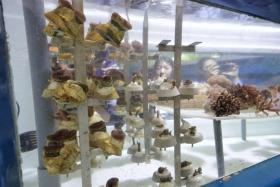Dengue cases likely to rise further: NEA
Low herd immunity to DenV-3 virus type may lead to higher transmission
Dengue infections are on the rise as Singapore battles to contain the spread of the coronavirus.
They are expected to go up even further, said the National Environment Agency (NEA), as there may be a switch in dominant serotype - something that usually precedes an outbreak.
This is because fewer people would have been infected, resulting in low herd immunity in the population, and hence higher rates of transmission.
This time, if a switch does occur, it may lead to a big outbreak - as the rising mosquito-transmitted virus type DenV-3 has not been dominant here at least for the past 30 years. The switches have always been between DenV-1 and DenV-2.
There were 400 dengue infections last week, up from 371 in the previous week. There were another 63 cases between Sunday and 3pm on Monday.
The weekly cases had been rising steadily since mid-December, peaking at 404 cases in mid-January. The number dropped the following week but is again on the upswing.
This year, the number of dengue infections has ranged between 303 and 404 a week.
The 1,723-case total in the first five weeks of the year is over 60 per cent higher than the 1,057 infections diagnosed over the same period last year, when Singapore saw its third highest annual rate of dengue infections. These latest weekly figures are also the highest rates seen in the early part of the year, since 2016.
NEA said on its dengue website: "The high Aedes aegypti mosquito population in the community, current high number of dengue cases, and increase in circulation of DenV-3 serotype, could lead to weekly dengue cases rising above current levels in 2020."
DenV-3 cases have been rising over the past three months.
DOMINANT VIRUS TYPE
NEA told The Straits Times that while it is still too early to say there has been a switch of dominant dengue virus type, there have been more infections by DenV-3 than DenV-2, which has been dominant since 2016.
The spokesman added: "The monthly proportion of DenV-3 cases in January was approximately 47 per cent, higher than the proportion of DenV-2 cases at 39 per cent."
She said this means a larger proportion of the population is now susceptible to dengue.
"The rise in proportion of DenV-3 cases is of concern, because DenV-1 and DenV-2 have been the predominant circulating serotypes in Singapore in previous years," she added.
NEA said there are now 114 active dengue clusters - with large clusters in Begonia Drive (166 cases), Gangsa Road (96 cases), Jalan Kembangan (85 cases), Ang Mo Kio Avenue 10 (67 cases) and Jurong West Street 91 (57 cases).
There are 23 "red" clusters where more than 10 people have been infected. Cases are linked if the onset of symptoms is within 14 days and their homes or workplaces are located within 150m of one another.
NEA said: "Concerted community action and sustained mosquito control efforts are thus needed to prevent further escalation of the Aedes aegypti mosquito population, and an increase in the number of people becoming ill with dengue."
Last year, dengue claimed 20 lives.
Get The New Paper on your phone with the free TNP app. Download from the Apple App Store or Google Play Store now


